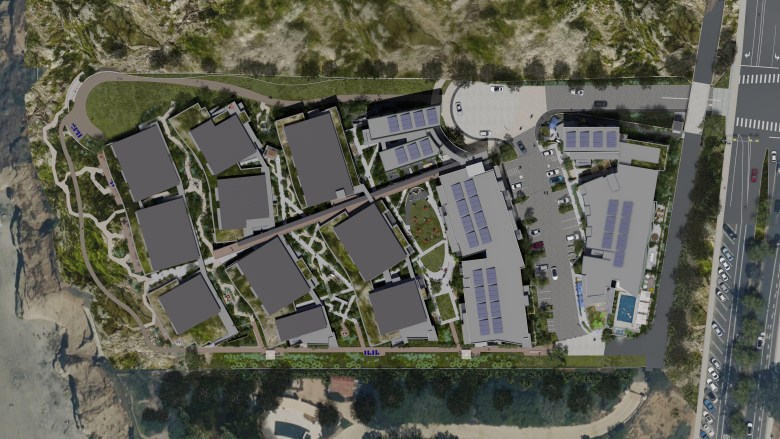A lawyer representing Seaside Ridge, a 259-unit housing project, has asked Del Mar city staff to deem their proposal complete or outline the process of having the plan heard by the City Council.
In the July 10 letter,
Brooke Miller
, special counsel at Sheppard Mullin, asks Del Mar Principal Planner Matt Bator that his staff complete either step within 10 days for the project, proposed on a vacant 7-acre site in north Del Mar near Dog Beach.
The developers said 10 days is a reasonable timeframe for Del Mar staff to confirm their project proposal outright or provide procedural information about holding a council hearing within 60 days. Local governments, the attorney noted, are required to respond to Public Records Act requests within the same timeframe.
According to a press release from Seaside Ridge, developers submitted their project proposal — which includes 43 units for households with moderate incomes and 42 units for lower-income households — in October 2022.
According to Miller’s letter, city staff reviewed Seaside Ridge’s proposal and deemed it incomplete three times in 2023, in April, June and September.
Miller took issue with that designation.
“In short, the city cannot require the project to apply for discretionary approvals and cannot refuse to process the project application as ‘incomplete’ for failure to do so,” Miller writes. “The city’s continued failure to process the application is a violation of applicable state law.”
Last year, Seaside Ridge brought a lawsuit against Del Mar for allegedly disregarding state housing laws after the development proposal was repeatedly labeled as incomplete.
A San Diego Superior Court judge ruled in June that the project’s “administrative remedies” with the city have to be exhausted before the lawsuit can proceed.
According to the press release, Seaside Ridge can proceed with its lawsuit if “the city continues to delay or finds the application incomplete.”
In their three reviews of the project proposal, city staff did not outline a path for Seaside Ridge to be presented to the city council for a vote.
“Seaside Ridge asks city staff to determine that the application is complete, or else identify a process that would allow the applicant to appeal staff’s ‘incomplete’ determination directly to the city council,” the press release says. “There is currently no such process in the city’s municipal code.”
In the lawsuit, Seaside Ridge alleges that the city must approve the proposal because of a state housing law known as Builder’s Remedy.
In California, if a project proposal with
enough affordable housing units
was finalized in a city before the
California Department of Housing and Community Development
ratified that city’s affordable housing plan — officially known as a city’s Housing Element — than Builder’s Remedy forces the city to approve the proposal.
Roughly one-third of the units at Seaside Ridge are considered affordable and the project proposal was submitted before the the state housing department
ratified
the Del Mar Housing Element — which they finalized in May 2023.
According to the state, Del Mar
failed
to propose a compliant Housing Element by their initial deadline, April 15, 2021.
According to a
fact sheet
about Builder’s Remedy by the Association of Bay Area Governments, cities can only stymie an affordable housing development protected by Builder’s Remedy if the project
meets one of five conditions
— such as the proposal not conforming to local zoning laws.
In her letter to Del Mar planners, Miller claims that Seaside Ridge does not fall under any of the five categories — and the zoning stipulation in particular — that can freeze a Builder’s Remedy proposal.
Miller claims that the city failed to complete a required rezoning of Seaside Ridge within a one-year window, while the developer of Seaside Ridge fulfilled their obligations.
According to Miller, reforms to Builder’s Remedy that took effect at the start of 2025 prohibit the city from applying for a rezoning of the Seaside Ridge area.
“[Del Mar’s] refusal to process a valid Builder’s Remedy application is a violation of State Housing Law,” the letter says.
Get neighborhood news in your inbox. It’s free and enlightening.
Join the 20,000+ people who get Times of San Diego in their inbox at 8 a.m. every day – plus breaking news alerts.
We’ve also added weekly updates from San Diego neighborhoods! By clicking sign up, you agree to the
terms
. Select below.
Affordable housing units at Seaside Ridge
Out of the 42 units at Seaside Ridge designated as lower-income, there are two for extremely-low-income units, two very-low-income units and 38 low-income units, according to the development’s
website
.
The development plans 43 additional moderate-income units.
In San Diego County, households making 15% to 38% of the local median income are considered extremely-low income; 38% to 63% median income is very-low income; and 63% to 101% median income is low income.
California
calculates the median income in each county, which is scaled by household size.
The median income for a family of four in San Diego County is $130,800 — $11,900 more than the average median income across California counties in metropolitan areas.
According to
California’s housing department
, Del Mar must build 31 moderate-income units, 64 low-income units and 37 very-low-income units between 2021 and 2029 — the current Regional Housing Needs Assessment
cycle
.
At just past the halfway mark of the current cycle, Del Mar has permitted 55 moderate-income units and no very-low-income or low-income units.
Seaside Ridge plans to develop at 929 Border Avenue in Del Mar, which is listed for sale.
The asking price is $76 million
.

 by
by 

